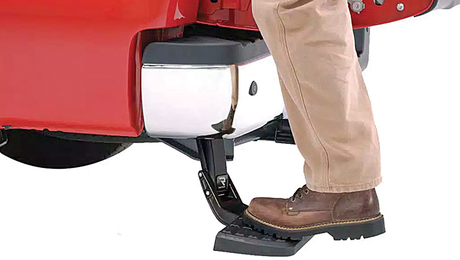I’ve been five years without a shop. I want to convert a garage–I think. Because I’m not sure how much time I’ll be spending in it, I want to be economical. Does anyone have advice on the best way to moisture-proof, seal, a standard garage-floor slab? I own a new propane 50-gal. water heater. Would it make sense to think of radiant-floor heating? Could I put down plastic, then tubing, and pour a thin concrete overlay? Obviously the first problem is moisture through the floor. (I’ve already got plenty of rust on stored equipment.)Heating is secondary. Thanks.–Harriet Hodges
Discussion Forum
Discussion Forum
Up Next
Video Shorts
Featured Story

The RealTruck AMP Research Bedsteps give you easy access to your truck-bed storage.
Featured Video
How to Install Exterior Window TrimHighlights
"I have learned so much thanks to the searchable articles on the FHB website. I can confidently say that I expect to be a life-long subscriber." - M.K.














Replies
One thing I wish I had for-thought on my shop is finishing space for wood. I am limited to waterborne topcoatings because I heat with a propane tube heater, and the solvent-borne finishes are too flammable plus no good ventilation, but they look much better imho. Also contact cement is iffy to use in my shop. Radiant heat, planning for dust control, and better ventilation would be nice. I put tons of circuits in so there's a receptacle convenient all around. PEX tubing for radiant is available from a lot of different suppliers and can be set in a topcoat of cement over a slab.
remodeler
Thanks so much. I'd not been thinking about solvents--and I have never used water-borne finishes and hadn't intended to start. Now I know to put the heater in its own "room" if I use it.--Harriet Hodges
HH,
If the slab is insulated, it would make plenty of sense to use the GWH and tubes to heat the garage. I just did the same, but I tore out he old slab first as part of a remodel (it sloped such that any snow melt, water, etc., would collect at the wall next to the house). Using a "spare" water heater, it cost me about $1200 for materials and equipment (900 ft BPEX, circulator, air separator, expansion tank, manifolds, pressure reducing valve, pressure relief valve, thermostat, guages, misc fittings and pipe, and 1" foam under the slab), exclusive of the concrete work. Depending on the construction and the climate, a GWH may not have enough capacity to heat the space.
There are some excellent garage floor coatings, based on expoxy, that will seal the slab completely and provide a nice non-slip surface as well. I don't know the specifc on who makes them or the cost, but I know they are available. Good luck.
Tim
Thanks. The slab is not insulated. You've given me a good idea of costs for the entire job, doing it right. I will look into epoxy coatings. Seems like they would abrade badly under wear--but maybe not.
Harriet Hodges
Check out Abatron for floor coatings:
http://abatron.com/
bit
The durability of the epoxy floor coating will rival that of the concrete itself. Unless you constantly drop very heavy objects on the floor, it will last indefinitely. I worked for years at a commercial power plant that had been in operation for 20 years, and the epoxy coated floors were in very good shape.
I did some work in my garage repairing some floats with fiberglass and epoxy. Some of the epoxy drip on the floor covered with sanding dust and stuck. When I tried to remove the curved epoxy it popped finished concrete.
But I am sure that if I clean the floor, etch it, make sure that it is dry, and the correct tempature and put down an epoxy paint that it will peal in two days <VBG>